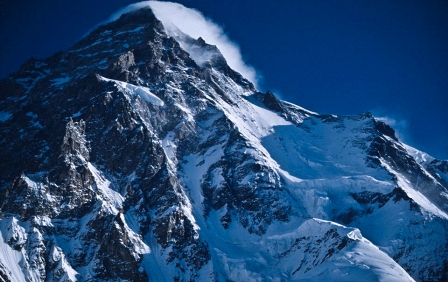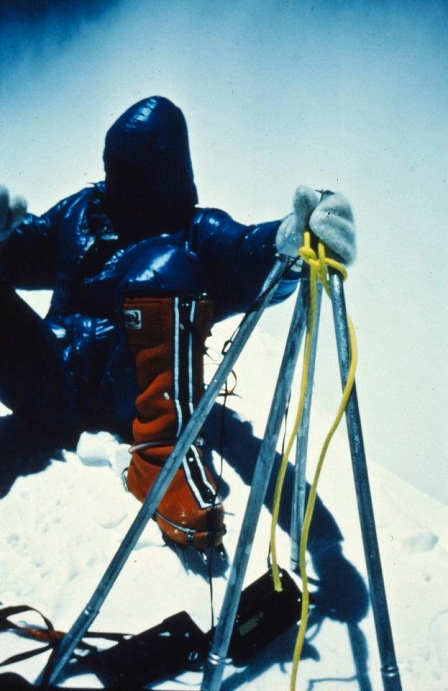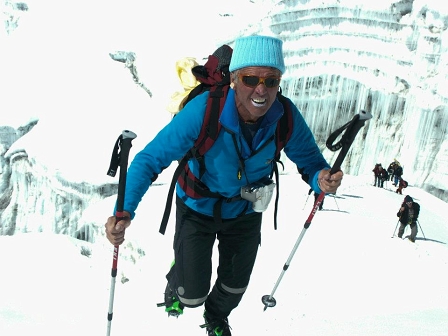Erstellt am: 29. 9. 2015 - 14:50 Uhr
"We Don't Conquer Mountains, They Tolerate Us"
Mount Everest, the world's highest mountain, is a place where the legends of mountaineering made their names. For example, when the Austrian Peter Habeler climbed the mountain in 1978 with his partner Reinhold Messner they were the first two to achieve the feat without supplementary oxygen.
Everest was a test for the best of the best.

habeler.com
Peter Habeler was taking me on a pre-dawn ascent of a minor peak in the Tyrolean Alps. It was dark and grisly weather, the wind-blown rain lashing down on us and it was just essentially a bog-standard hike. But the legendary climber, remarkably fit and sprightly at the age of 73, showed no signs of dampened spirits.
“I still love being in the mountains,” he smiled as the rain splashed against our headlamps.
Interestingly he doesn’t see the Everest ascent that made his name as the highlight of his long climbing career: “I was afraid on Everest. I had my brakes on because I was married with a baby and I wasn’t sure whether it was possible. Finally Messner gave me a kick and said ‘Come on Peter, let’s do it.’ And I am happy and proud we made the ascent, but my favourite memory is climbing Kangchenjunga. That was a more interesting climb.”
Crowded And Dangerous
But for many people Everest remains the ultimate challenge and that’s why it draws crowds – some of them determined to add an ascent to the world’s highest mountain to their CV before they have attempted much smaller mountains. That’s possible, if you can pay tens of thousands of dollars, because there are fixed ropes, teams of Sherpas and hired guides who can shepherd you up and make all the essential decisions for you.
Dieses Element ist nicht mehr verfügbar
In recent years an average of 600 climbers attempt the ascent every season. But if you don’t have the individual skills and the individual experience to make the right decisions, Habeler feels you are tempting disaster. “It’s hard to select the mountaineers. Just because you pay $60,000 it doesn’t mean you are qualified. There are a number of mountaineers who put on their crampons for the first time at base camp. It’s a nuisance.”
Of course, tourism has boosted the fragile economy in Nepal and the Sherpas, once a disadvantaged minority, have profited. But Habeler has joined others in complaining that much of the money goes to foreign organisers of the expeditions and the local guides, who take all the risks, and support staff can only pick up the financial crumbs.
Habeler says he had the privilege of climbing in a “golden age of mountaineering” He says that when his generation tackled the great peaks like Everest, K2 and Kangchenjunga the Himalayan mountains were lonely exclusive places:

habeler.com
“There was just one expedition in the pre-monsoon season and one in the post-monsoon season. Even if three had been allowed it would have been alright. But nowadays there are hundreds of people. It’s a major problem.”
The Tyrolean is not alone with his concerns. Last week Junko Tabei, the first woman to conquer Everest, told the press that “Allowing a large number of climbers in a season poses high risks to the mountain environment and the climbers as well.” There have been great tragedies, including the 8 fatalities suffered during one day 1996 - a disaster depicted in Baltasar Kormákur’s current film Everest.
There has also been criticism that the area around base camp has become a junk yard, a dumping ground for used oxygen tanks, discarded climbing equipment, cooking pots and even cans of beer; as well a human waste that doesn’t compose in such cold temperatures.
Now Nepal has reacted to the criticism, announcing that to counteract disasters and overcrowding. Tourism minister Kripasur Sherpa says authorities will demand for “proof of competence” from climbers before the beginning of the next spring climbing season. This proof is understood to include evidence that the climbers have already scaled mountains that are higher than 6,500 metres.
“We cannot let everyone go on Everest and die,” said Kripasur Sherpa “If they are not physically and mentally fit it will be like a legal suicide.”
As I tramped through the rain with Habeler I asked him what he felt had made his expedition to Everest successful. He pointed out that length of the preparations, the attention to detail and also the slow team building process.
The key, it seems, is trust. “I knew it was important not to worry too much. I wanted to be really well acclimatized and to be in a really safe team where everyone knew each other. We had two doctors and we had known them for years.”
The Shadow of Messner
I’ve found that if you ask most people who was the first person to climb Everest without supplementary oxygen, they instinctively name Reinhold Messner and forget to mention his climbing partner Habeler.
Messner has lived his life in the limelight, following up his mountaineering with expeditions to the Poles, to the Gobi Desert and even to Brussels (where he served as an MEP for the Greens) Habeler has in contrast rather eschewed the limelight.

habeler.com
“Reinhold is a very different person to me. He has done very well. But the time we spend together was outstanding. I have gone a different path and I am still climbing. I still get a kick out of making challenging climbs. I still love it.”
A Philosophiser of the Mountains
For me, an unapologetic groupie, hiking with Peter Habeler is a lesson in mountain philosophy. He refuses to claim he has conquered Everest, insisting that he is grateful that the great mountain merely tolerated his presence for a while. He doesn’t like the war jargon that is so often associated with feats of mountaineering:

European Forum Alpbach
“I love the mountains. I think it is fantastic if we can understand not the hardness of the mountain but their softness. People talk about fighting the mountain, fighting the cold, fighting the storm, fighting themselves, fighting who the hell knows what.
You know we go to a mountain and try to climb it but we sneak up and respect the mountain. Maybe we can be strong enough that day and reach the summit and if not then we turn back and go back down and that is just as well.”


